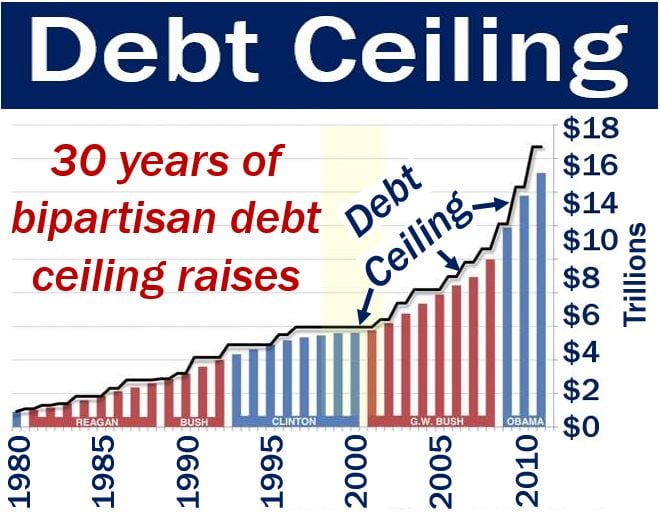
The idea of a debt ceiling is not unique to just one nation. The United States is one of the countries with a debt ceiling mechanism in place. While the limit is an actual number in the United States and Denmark, it is a percentage of GDP in other countries like Kenya. The government goes through a process to raise or suspend it when it has to increase borrowing above the current debt ceiling. Legislative action is typically involved in this process. A bill to raise the debt ceiling, enabling the government to borrow additional money, may be discussed and voted on by lawmakers. But what is a debt ceiling and why is it important? The query will be thoroughly explained in this article.
What Is the Debt Ceiling?
The debt ceiling is the maximum amount of money that a government can borrow in order to finance its activities and fulfill its obligations. It is a legal cap placed on the total amount of national debt that can be issued by the legislative branch of a government, usually the parliament or congress. The legislative branch sets the debt ceiling in many nations including the United States. A specific debt cap is proposed by the government, and lawmakers must approve it. Legislative consent is frequently required for debt ceiling adjustments.
Why Does the Debt Ceiling Matter?
The debt ceiling is significant for a number of reasons. Here are some of the most important.
- Financial stewardship: The debt ceiling is a mechanism for encouraging financial restraint and limiting governmental borrowing. It establishes a cap on the total amount of debt that the government may accrue, ensuring that borrowing stays within acceptable parameters.
- Government operations: The government’s capacity to raise funds directly depends on the debt ceiling. When the debt ceiling is reached, the government is unable to borrow more money to fund its operations. This may result in a cash shortage, making it challenging for the government to fulfill its financial commitments such as paying staff, sustaining programs, or paying interest on debt.
- Preventing default: Preventing the government from going into default on its financial obligations is one of the main reasons the debt ceiling is important. The government might not be able to make interest or principal payments on its outstanding debt if the debt ceiling is not increased or suspended and there is a funding shortage. In addition to harming the government’s credit rating and raising borrowing costs, defaulting on debt can also undermine investor confidence in the nation’s financial stability.
- Economic stability: The debt cap affects the economy as a whole. Failure to raise the debt ceiling and the subsequent danger of default can result in higher borrowing costs for the government, which can have an impact on consumer and commercial interest rates. Investments may underperform, and financial markets may become erratic while economic development may suffer. When used wisely, the debt ceiling promotes economic stability through restraining spending and guarantees that the government can continue to make payments on its debts without interruption when it is set at a reasonable level.
- Political considerations: Politicians frequently discuss and negotiate the debt ceiling. On fiscal policy, spending priorities, and the proper level of public borrowing, various political parties or groups may hold contrasting opinions. Debates about raising the debt ceiling or engaging in political brinkmanship can cause unrest, disrupt the financial system, and erode public faith in the government’s financial management.
Conclusion
It is vital to consult the individual laws and regulations of the applicable government for detailed information because the complexities and processes around the debt ceiling vary from one nation to another. It is crucial to remember that depending on the particular nation and its political and economic situation, the effects of approaching the debt ceiling and the steps taken to resolve it can vary. The debt ceiling is still an important part of fiscal policy and managing the public purse, nevertheless.
Interesting Related Article: “US debt crisis a threat to global economy, IMF“

